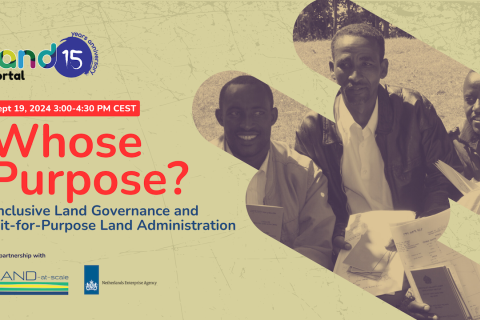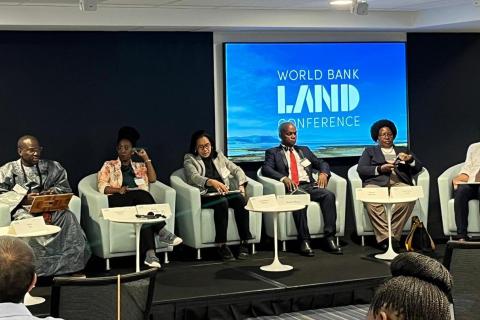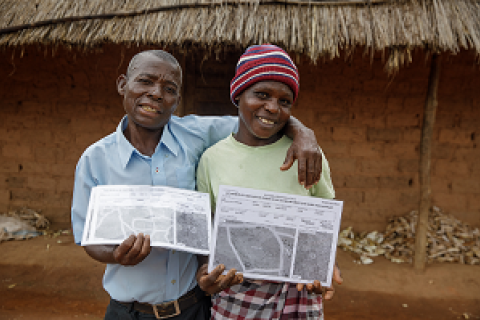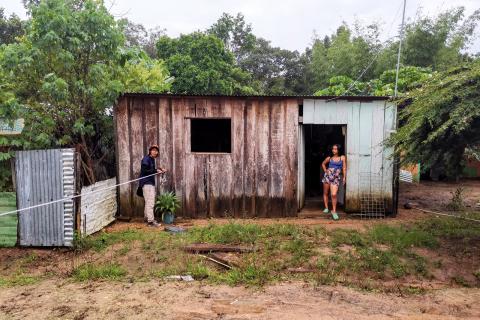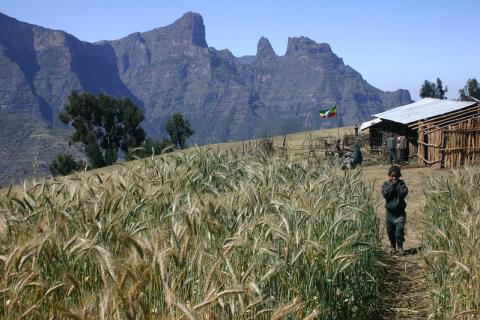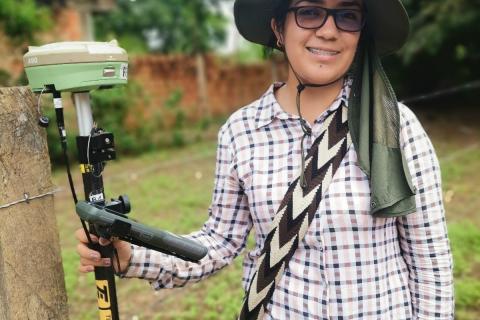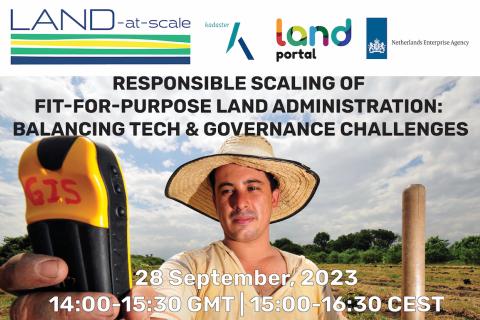Recapitulação dos painéis da Conferência de Terras do Banco Mundial
Depois de um intervalo de quatro anos, a Conferência sobre Terras do Banco Mundial foi realizada novamente em Washington, D.C., em maio deste ano, reunindo milhares de representantes de governos, da sociedade civil e de partes interessadas em terras de maneira presencial e outros milhares de forma virtual. O tema da conferência de 2024 foi “Assegurando a posse e o acesso à terra para a ação climática”, um quadro empolgante e significativo para a discussão de uma questão que nos interessa muito: o acesso aberto a informações sobre terras.
O Land Portal organizou um painel sobre a criação de uma infraestrutura robusta e aberta de informações sobre terras para segurança de posse e ação climática na África, moderado por Romy Sato. A sessão contou com um excelente painel de palestrantes dos setores público e privado, representando perspectivas sobre dados de terras de Malaui, Madagascar, Moçambique, Namíbia, Senegal e Uganda.
Reflexões da equipe sobre a Conferência de Terras do Banco Mundial 2024
Depois de um intervalo de quatro anos, a Conferência sobre Terras do Banco Mundial foi realizada novamente em Washington, D.C., em maio deste ano, reunindo milhares de representantes de governos, da sociedade civil e de partes interessadas em terras de maneira presencial e outros milhares de forma virtual. O tema da conferência de 2024 foi “Assegurando a posse e o acesso à terra para a ação climática”, um quadro empolgante e significativo para a discussão de uma questão que nos interessa muito: o acesso aberto a informações sobre terras.
Desvendando o poder dos dados abertos para a ação climática
Imagine um mundo em que todas as comunidades tenham os dados, as informações e o conhecimento necessários para tomar decisões informadas sobre a terra que chamam de lar. Um mundo em que o poder da informação é aproveitado para responsabilizar os(as) líderes pelo gerenciamento sustentável de recursos naturais essenciais. Esse é o potencial transformador dos dados abertos e acessíveis sobre a terra na luta contra a mudança climática, que é o desafio definitivo de nosso tempo, ameaçando a vida e a subsistência de comunidades em todo o mundo.
Scaling Community Land Rights Certification in Municipal Areas of Mozambique: the launch of a new LAND-at-scale project
Terra Firma and the Netherlands Enterprise Agency (RVO) are pleased to announce the launch of a new LAND-at-scale project: Scaling Community Land Rights Certification in Municipal Areas of Mozambique. The project started implementation this month (February 2024) in the rural hinterlands of four municipalities in Manica, Sofala and Zambezia provinces.
The Wait is Over
The USAID-funded Land for Prosperity Activity is developing capacity in land administration across all levels of government to strengthen land rights in underfunded municipalities across Colombia.
Promessas e realidades da formalização de terras na África
A formalização dos sistemas fundiários - como um tipo de reforma agrária - cumpriu as promessas de melhorar a segurança da posse, a produtividade agrícola e o acesso das mulheres à terra? Saiba mais nesta história de dados.
Combatendo os estereótipos na administração de terras
Como uma agrimensora em um escritório de terras rural na Colômbia superou desafios para se encontrar em uma carreira dominada por homens.
Recapitulação de webinário: Dimensionamento responsável da administração de terras adequada à sua finalidade
Este webinário, o primeiro da série "Dimensionamento responsável", foi realizado em 28 de setembro de 2023 com o título "Dimensionamento responsável da administração de terras adequada a sua finalidade: Equilíbrio entre os desafios tecnológicos e de governança". O webinário reuniu um pouco mais de 350 participantes e contou com a participação de painelistas, desde jovens profissionais até membros do ministério. O webinário foi organizado por um consórcio de organizações, incluindo a Fundação Land Portal, a Agência Holandesa de Empreendimentos e Desenvolvimento (RVO - sigla em inglês) e a Kadaster.
Impulsionando a revolução dos dados: Empoderando a governança de terras por meio de metadados abertos
Uma nova publicação intitulada "The Role of Metadata and Open Data in the Innovation Cycle of Land Administration" (O papel dos metadados e dos dados abertos no ciclo de inovação da administração de terras) destaca esse domínio dinâmico. Essa publicação oferece percepções valiosas sobre a importância dos dados abertos e metadados estruturados e como eles podem revolucionar os processos de administração de terras em todo o mundo. Ao se aprofundar nos princípios fundamentais de dados abertos e metadados, esta publicação oferece uma compreensão abrangente de como essas ferramentas podem ser aproveitadas para promover a inovação e impulsionar mudanças positivas no setor de governança fundiária.
Impulsionando a revolução dos dados: Empoderando a governança de terras por meio de metadados abertos
Uma nova publicação intitulada "The Role of Metadata and Open Data in the Innovation Cycle of Land Administration" (O papel dos metadados e dos dados abertos no ciclo de inovação da administração de terras) destaca esse domínio dinâmico. Essa publicação oferece percepções valiosas sobre a importância dos dados abertos e metadados estruturados e como eles podem revolucionar os processos de administração de terras em todo o mundo.
Melhorando o acesso aos dados fundiários: Índice SOLI e o Guia Aberto
Como defensor dos dados fundiários abertos, a Fundação Land Portal tem como objetivo melhorar o acesso aos dados de terras, envolver as partes interessadas e apoiar ações que promovam a abertura dos mesmos. Recentemente, tive a oportunidade de apresentar o Índice de Informações sobre o Estado da Terra (SOLIndex) e falar sobre o Guia Aberto na Reunião de Parceiros da Rede Global de Ferramentas Fundiárias (GLTN), em Nairóbi, e mostrar como essas ferramentas desempenham um papel fundamental na melhoria do acesso às informações sobre a terra.

